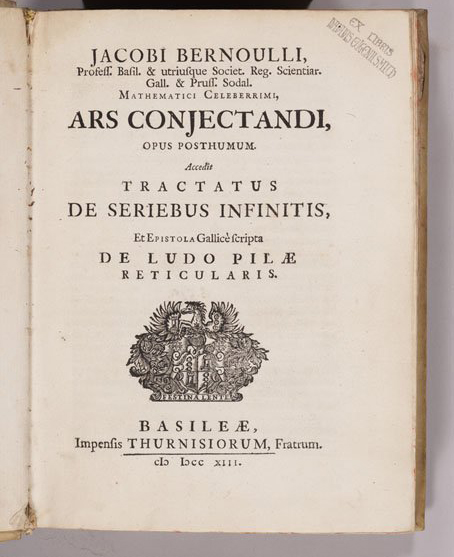- About MAA
- Membership
- MAA Publications
- Periodicals
- Blogs
- MAA Book Series
- MAA Press (an imprint of the AMS)
- MAA Notes
- MAA Reviews
- Mathematical Communication
- Information for Libraries
- Author Resources
- Advertise with MAA
- Meetings
- Competitions
- Programs
- Communities
- MAA Sections
- SIGMAA
- MAA Connect
- Students
- MAA Awards
- Awards Booklets
- Writing Awards
- Teaching Awards
- Service Awards
- Research Awards
- Lecture Awards
- Putnam Competition Individual and Team Winners
- D. E. Shaw Group AMC 8 Awards & Certificates
- Maryam Mirzakhani AMC 10 A Awards & Certificates
- Two Sigma AMC 10 B Awards & Certificates
- Jane Street AMC 12 A Awards & Certificates
- Akamai AMC 12 B Awards & Certificates
- High School Teachers
- News
You are here
Euler and the Bernoullis: Learning by Teaching - Jakob Bernoulli
The Bernoulli family in the eighteenth century produced an astounding number of topflight mathematical minds. The first of these was Jakob Bernoulli (1654-1705). Born in Basel in December of 1654, nearly 13 years before his brother Johann, the taste for mathematics was aroused in Jakob from a very young age.
 |
 |
Figure 2. Jakob Bernoulli (1654-1705) around 1687 (Wikimedia Commons, public domain), together with the title page of his best-known work, Ars Conjectandi, published in 1713 (courtesy of Butler Rare Book and Manuscript Library, Columbia University Libraries. You may use this image in your classroom; all other uses require permission from Columbia University Libraries. See Jacob Bernoulli's Ars Conjectandi here in MAA Convergence for more information.)
The first text Jakob studied was Die Coss (1525), the first algebra book written in German, by Christoff Rudolph. Even today, dictionaries define “cossic” as “relating to algebra.” The term is derived from the Italian cosa or thing, as in ‘unknown quantity.’ Scholars of algebra were called “cossists.” Jakob attended the University of Basel, but he learned very little mathematics there. He earned an M.A. at Basel in 1671 at age 16, “having followed a rather classical and humanistic curriculum, strong on languages but basically Aristotelian in its approach to science.” [11, pp. 4-5] His father, Nicolaus Bernoulli (1623-1708), wanted him to enter the ministry in the Reformed Church, as did Leonhard Euler’s. Switzerland, the home of John Calvin (1509-1564), was a stronghold of Protestant Christianity, and careers in the ministry were a common goal. In spite of Nicolaus’s wish, after obtaining degrees in philosophy and theology at Basel, Jakob wanted to travel and to continue to pursue mathematics. He chose a motto for himself: “Invito patre sidera verso,” or, “Despite my father, I turn to the stars.” [11, p. 7]

Figure 3. View of Basel, Switzerland, and the Rhine River around 1648, copper-plate engraving by Matthäus Merian the Elder (1593-1650) (Wikimedia Commons, public domain)
To learn more about mathematics than was possible at the University, Jakob traveled to Geneva. However, before he found a tutor, he became one. He entered the employ of the Waldkirch family in 1676 as tutor to the young, blind Elizabeth Waldkirch. His task was to help her learn to read and write – not a common accomplishment for the blind at that time. He continued in this occupation until 1678. M.B.W. Tent suggested, in her fictionalized account of the lives of Euler and the Bernoullis, [12] that the elder Waldkirch wanted someone trained in mathematics, since he had learned that the mathematician Girolamo Cardano (1501-1576) had been involved in teaching literacy to the blind. It is worth noting that it is still true today that many professions seek mathematically trained candidates or use mathematics tests for eligibility, not because the job requires the specific skills involved, but because the assumption is that minds that can grasp mathematics are disciplined and sharp. This is a fact which the author shares with his students regularly.
What skills as a teacher might Jakob Bernoulli have gained from this experience? There is a certain poetry in the idea that the man who would bring light to so much that was dark in mathematics began his teaching career by alleviating the disadvantages of physical blindness. If Tent was correct that he obtained this opportunity due to being a mathematician, then there is a second level of unexpected appropriateness here.
The early tutoring experiences of Jakob Bernoulli suggested to the author an at-home activity to assign our students. Rather than merely requiring the students to solve problems, ask them to find volunteers and teach the volunteers how to solve the problems. Each student will write a brief log entry of how the process goes, what explanations worked or failed, and how her “student” responded. Even if the person “tutored” in this way is unprepared for this level of mathematics, his response to it may be instructive for, or resonate with, our students.
Paul Bedard (Saint Clair County Community College), "Euler and the Bernoullis: Learning by Teaching - Jakob Bernoulli," Convergence (August 2015)




